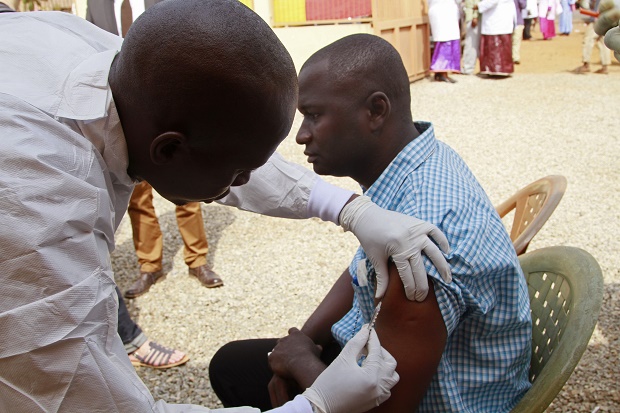Shortage of malaria drug points to better tool vs Ebola

In this March 7, 2015 file photo, a health worker, left, injects a man in his arm with an Ebola vaccine in Conakry, Guinea. In the biggest study to test whether the blood of Ebola survivors helps patients, doctors found the experimental treatment didn’t make a difference and some scientists say it’s time to shelve the approach. With no licensed treatment for the devastating disease, doctors have sometimes used blood from survivors to treat the sick, hoping its infection-fighting antibodies might help patients defeat the virus. It seemed to help some patients in the past but there was no clear proof. Amid the world’s biggest outbreak of Ebola in West Africa in 2014, scientists decided to put the treatment to the test in Guinea. AP File Photo
MIAMI, United States—As doctors struggled to treat growing numbers of patients during the Ebola crisis in West Africa, the shortage of one helpful drug may have led to the discovery of a better one.
The results of a study published Wednesday in the New England Journal of Medicine show that Ebola patients given an anti-malarial drug called artesunate–amodiaquine (ASAQ) had a 31 percent lower risk of dying than those given the standard treatment for the mosquito-borne disease.
READ: Celebrations as WHO declares Sierra Leone Ebola-free
The results point to a potentially promising treatment for a disease that has no market-approved treatments or cures, as researchers scramble to come up with a vaccine before the next outbreak strikes.
The study came about when a treatment center run by Doctors Without Borders in Foya, Liberia, “ran out of its supply of artemether–lumefantrine (AL) after a sudden spike in admissions to the center” in August 2014, said the report.
Article continues after this advertisementSuddenly, 100 cases of confirmed Ebola virus were being admitted each week to what had started as a 10-bed isolation unit in a former refugee transit center.
Article continues after this advertisementREAD: Sierra Leone’s last known Ebola patients leave hospital
The substitute drug, artesunate–amodiaquine, was prescribed for all patients with suspected Ebola virus disease who were admitted to the treatment center for a period of 12 days, “with no other known systematic changes in care,” said the report.
Anti-malaria medicines are routinely given to suspected Ebola patients because the symptoms of the two illnesses—including fever, headaches and joint pain—often overlap.
Once the Ebola epidemic finally ebbed, researchers realized they had a significant group of patients—381 in all from June to October 2014—whose outcomes they could compare and analyze. Some had taken the standard treatment AL, others had taken ASAQ.
They found that 64.4 percent of the patients in the artemether–lumefantrine group died, compared to 50.7 percent of the patients in the artesunate–amodiaquine group.
The study had some limitations, including that records did not contain information about whether the patients completed their regimen of medication or not.
Also, since the pills are taken orally, some severely ill patients may not have been able to ingest them due to vomiting.
Researchers still do not understand what may make ASAQ more effective at saving lives, or if perhaps the standard drug AL is simply more risky, or more prone to causing death.
“Given the particular context of this study, we must remain cautious about drawing broad conclusions,” said co-author Iza Ciglenecki.
“To date, however, ASAQ appears to be a promising path towards an effective treatment. Further preclinical and clinical studies to confirm the effect of ASAQ in reducing the Ebola mortality are urgently needed.”
More than 11,000 people died during the West African Ebola epidemic, which lasted almost two years.